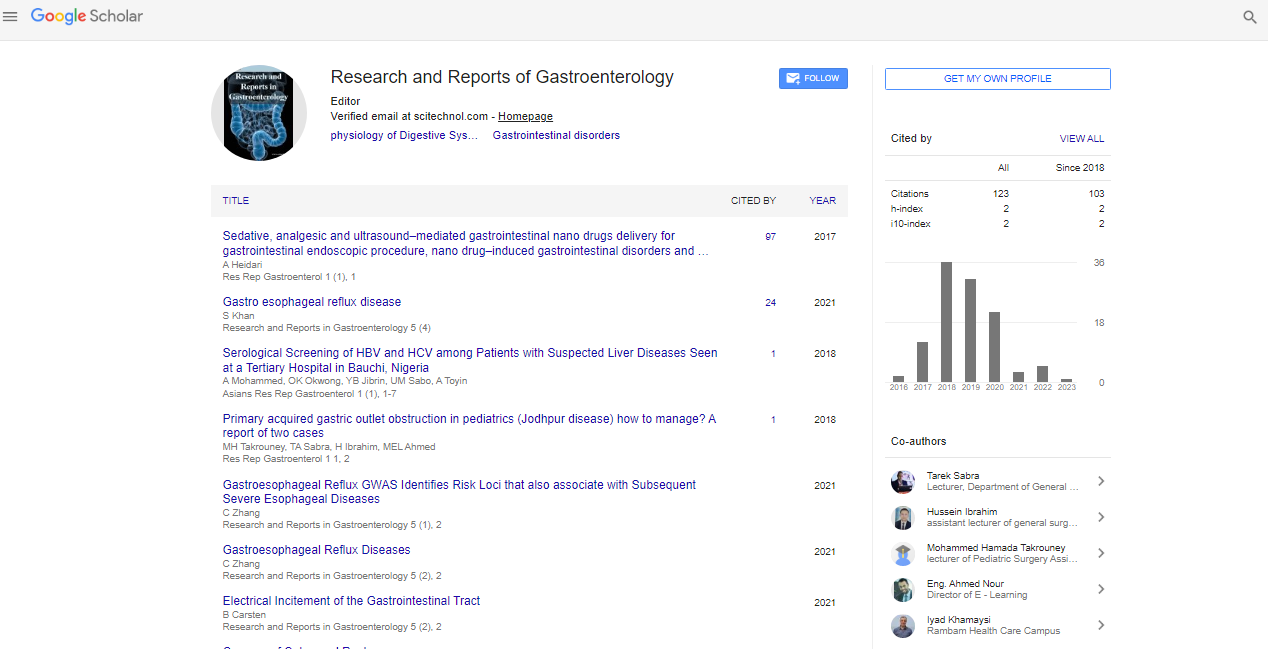Perspective, Res Rep Gastroenterol Vol: 7 Issue: 1
Membrane Vesicles and Their Role in Chronic Kidney Disease
Kristen Muraki*
Department of Gastroenterology, Graduate School of Medicine, Tokyo, Japan
*Corresponding author: Kristen Muraki
Department of Gastroenterology, Graduate School of Medicine, Tokyo, Japan
Email: muraki_km@jo.jp
Received date: 20 February, 2023, Manuscript No. RRG-23-97816;
Editor assigned date: 22 February, 2023, PreQC No. RRG-23-97816 (PQ);
Reviewed date: 08 March, 2023, QC No. RRG-23-97816;
Revised date: 15 March, 2023, Manuscript No. RRG-23-97816 (R);
Published date: 23 March, 2023, DOI: 10.4172/Rrg.1000128
Citation: Muraki K (2023) Membrane Vesicles and Their Role in Chronic Kidney Disease. Res Rep Gastroenterol 7:1.
Description
Membrane vesicles are small, spherical structures that are formed by the budding of cellular membranes. These vesicles have emerged as important players in intercellular communication, particularly in the context of Chronic Kidney Disease (CKD). CKD is a progressive and irreversible condition that affects millions of people worldwide, and is associated with a variety of complications, including cardiovascular disease, anemia, and bone mineral disorders. Understanding the role of membrane vesicles in CKD is therefore crucial for the development of new diagnostic and therapeutic approaches.
Membrane vesicles are released by a variety of cell types, including epithelial cells, endothelial cells, and immune cells. These vesicles contain a variety of biomolecules, including proteins, lipids, and nucleic acids, that can be transferred to neighboring cells, where they can exert a range of effects. For example, membrane vesicles can act as carriers of signaling molecules, such as cytokines and growth factors, that regulate cell proliferation, differentiation, and survival. They can also transfer genetic material, such as microRNAs, that can modulate gene expression in recipient cells.
In the context of CKD, membrane vesicles have been implicated in several key pathogenic processes. For example, it has been shown that vesicles released by injured kidney cells can induce apoptosis (programmed cell death) in neighboring healthy cells, thereby exacerbating kidney damage. In addition, vesicles released by immune cells can promote inflammation and fibrosis (excessive accumulation of scar tissue) in the kidney, which are key contributors to CKD progression. Finally, vesicles released by tumor cells can contribute to the development of renal cell carcinoma, a type of kidney cancer.
Given their role in CKD pathogenesis, membrane vesicles have attracted considerable interest as potential diagnostic and therapeutic targets. For example, the presence of specific vesicle biomarkers in urine or blood samples may serve as early indicators of kidney damage and disease progression. Moreover, targeting vesicle release or uptake may provide a means of inhibiting key pathogenic processes in CKD.
Several studies have investigated the use of vesicle biomarkers for CKD diagnosis and prognosis. For example, one study found that the presence of certain urinary vesicle proteins was associated with a higher risk of kidney function decline and mortality in CKD patients. Another study identified specific microRNAs in urinary vesicles that were predictive of CKD progression. These findings suggest that monitoring vesicle biomarkers may provide a useful tool for risk stratification and disease monitoring in CKD.
In addition to their diagnostic potential, membrane vesicles also hold promise as therapeutic targets. For example, several studies have investigated the use of pharmacological agents to inhibit vesicle release or uptake in CKD. One study found that inhibiting vesicle release by kidney cells reduced fibrosis and inflammation in a mouse model of CKD. Another study showed that blocking vesicle uptake by immune cells reduced inflammation and improved kidney function in a rat model of CKD. These findings suggest that targeting vesicle-mediated communication may provide a novel approach to mitigating the progression of CKD.
In conclusion, membrane vesicles play a key role in the pathogenesis of CKD, and represent a promising avenue for the development of diagnostic and therapeutic strategies. Further research is needed to fully understand the mechanisms underlying vesicle-mediated communication in CKD, and to develop targeted interventions that can be translated to the clinic. However, the emerging field of membrane vesicle biology offers exciting opportunities for advancing our understanding and treatment of this debilitating condition.
 Spanish
Spanish  Chinese
Chinese  Russian
Russian  German
German  French
French  Japanese
Japanese  Portuguese
Portuguese  Hindi
Hindi 